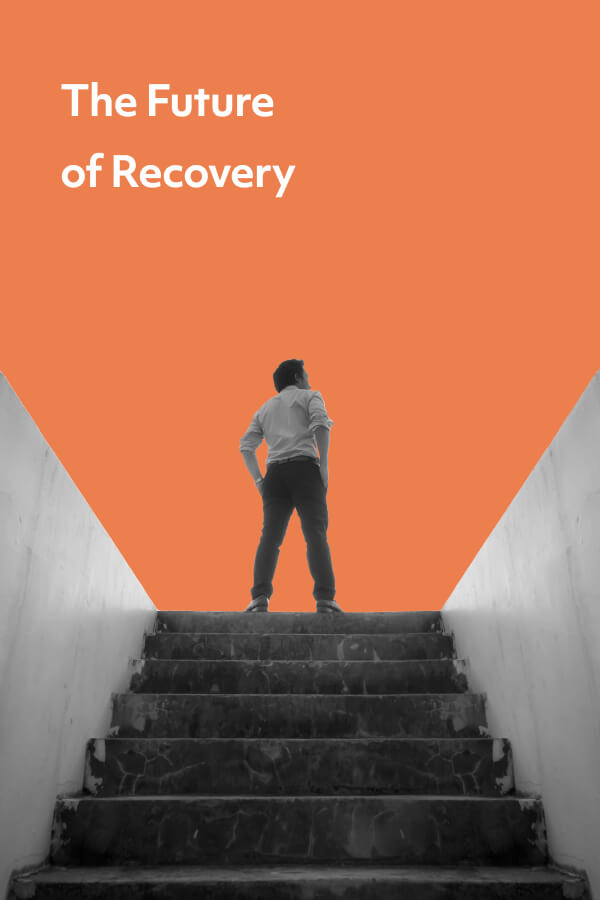When I think about the future of recovery, I’m excited. I feel a sense of wonder about what the recovery movement will do next. In many ways, the pandemic has been a catalyst for rapid evolution in the recovery space. No longer is recovery defined by sitting in a church basement listening to how we’re defective. Instead, thought leaders have innovated toward strengths-based treatments that we can now access at the touch of our fingertips and in the comfort of our own homes.
Just as recovery is an evolutionary process, so too is the new evolution of the recovery movement that seeks to break down barriers, increase access, expand networks of community support, and center the person at the heart of the recovery experience.
Person-centered recovery
A lot has changed in how we access recovery services in recent years. In the decades since AA came about, many people have attended in-person treatment at facilities that require participation in 12-step recovery (for those who were fortunate enough). Now those policies are changing. A large part of that change is the shift from a medical/clinical model of treatment—where the physician holds all authority but applies the same treatment to everyone—to a more person-centered model of recovery.
What we mean by person-centered is an empowered approach to your healthcare in which you are able to take charge of what you want for your recovery. From a clinical perspective, that means treating patients in a strengths-based way and viewing them as experts in their own lives. It’s about seeing the person, rather than the mental health disorder.
Robert D. Ashford, Ph.D., MSW spoke to this when considering how recovery will further evolve. “The future of recovery (I hope) is one of true person-centered identities and processes. A future where we have so much to offer in terms of modalities, approaches, and supports that everyone can find their own way on their own terms on their own time. Think personalized medicine, but on a recovery level.”
Technology has also been part of this shift. You can now access recovery through online peer services and digital addiction treatment. Regulators have also reduced barriers to medication-assisted treatment so that many folks can access these vital treatments via telemedicine.
Recovering out loud
Gone are the days that we absolutely needed to remain anonymous (unless it is linked to your professional registration). More and more people are unapologetically recovering out loud in an attempt to reduce stigma about addiction. Some might even say that sobriety has become popular.
Veronica Valli, author of Soberful, and a person who has seen first-hand how the recovery movement evolve told me, “In the last few years, we have seen sobriety come out of the closet and is finally being spoken about in the mainstream. In the 21 years I have been in recovery, I have seen some big shifts in this movement. More and more people are open about their journey and this has decreased the stigma about being a person in recovery.”
Speaking about digital recovery, Valli explained, “We have seen more treatment modalities open up to serve more people. The internet has made connection with other recovering people more possible.”
What comes next?
There are some big areas of growth that we can still make in the recovery movement, particularly when it comes to inclusivity and those who have been justice-impacted. That might look like increasing recovery-friendly workplaces. We can also continue to advocate for those who are disproportionately affected by the criminal justice system by improving their recovery resources and challenging how that system doesn’t work. It also means looking to people of color to lead in this space.
“The next big step for me is to redeploy the funding from the for-profit prison system to mental health substance abuse treatment. We need to move from treating addiction as a criminal issue to a mental health issue,” says Valli.
Other organizations, like Unity Recovery, are seeking to respond to those issues by employing those who have been justice-involved and helping them find work through their Recovery Friendly Workplace initiative.
We are seeing these innovations not only in access but also in terms of who is leading this experience. What I mean is, the recovery movement has become less white-centric and many of us are actively challenging the issue of race as being a very real inside issue to recovery spaces that cannot be ignored.
Arielle Ashford said that the future of recovery to her means, “We need to look to BIPOC and Indigenous folx to lead.” Powerhouses like Shauntelle Hammonds are a fine example of leadership in this space that is actively challenging the norms to make space for a more inclusive recovery by centering marginalized voices, training on equity and justice, and setting up recovery housing specifically for LGBTQIA folks.
When I reflect on the future of recovery, I hope for a recovery that centers non-dominant voices and is culturally responsive to the needs of people most impacted by substance use disorders.









